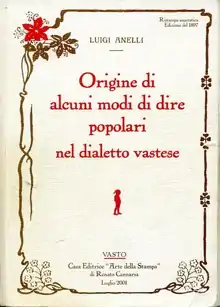Vastese
Vastese (Vastese: Lu Uâʃtaréule or Lu indialett di lu Uašt, meaning "the dialect of Vasto") is a Romance language spoken in the town of Vasto. It is considered its own language based upon the mutual unintelligibility of it and Italian.[1] It is not spoken by any other town, even the nearby town of Cupello, which is only 9 kilometres (5.6 mi) away.[2]
| Vastese | |
|---|---|
| Lu Vastarol | |
| Lu Uâʃtaréule | |
| Region | Italy |
| Language codes | |
| ISO 639-2 | nap |
| ISO 639-3 | nap (Neapolitan) |

History
Vastese's endonym — the name its speakers use for the language — is Lu Uâʃtaréule. This term is known to have originated in the sixth century AD.[1]
Demography
Today Vastese is spoken monolingually only by residents of Vasto in their 80s and 90s, bilingually by many residents in their 70s, and many middle-aged residents are passive speakers, while most younger residents have no comprehension.[1]
The Vasto Club in Australia is a club organized for migrants to Australia from Vasto.[2]
Phonology
Vastese has more vowel distinctions than Tuscan, Italy's official and standard language. It has vowels that are not in Italian, such as the open front unrounded vowel /æ/. Vastese uses an open back rounded vowel /ɒ/ for the start of the word uâʃtə. It also uses the mid central vowel /ə/. Vastese also uses several diphthongs not used in italian such as /aʊ/, /eʊ/, and /aɪ/.[1]
The influence of /i/, /u/, /Ī/, or /Ū/ upon /æ/, turns it into either /e/ or /je/.[3]
References
- "Vastesi Language - Vastesi in the World". Vastesi in the World. Retrieved 20 November 2016.
- Iuliano, Susanna (2010). Vite italiane : Italian lives in Western Australia. Crawley, W.A.: UWA Pub. p. 133. ISBN 9781921401503.
- Torres-Tamarit, Francesc; van Oostendorp, Marc; Linke, Kathrin (2016). Approaches to Metaphony in the Languages of Italy. Walter de Gruyter GmbH & Co KG. p. 151. ISBN 9783110366310.